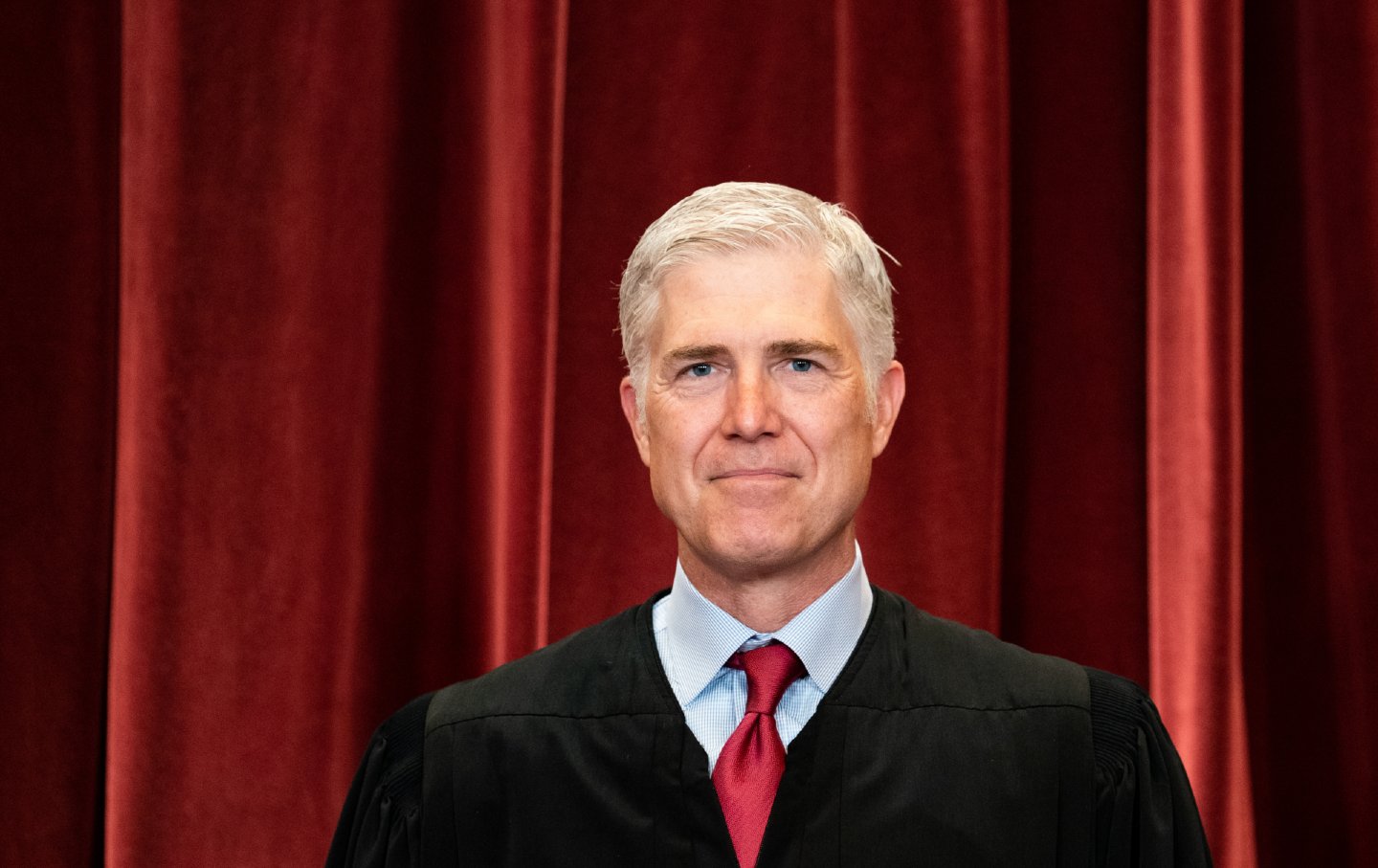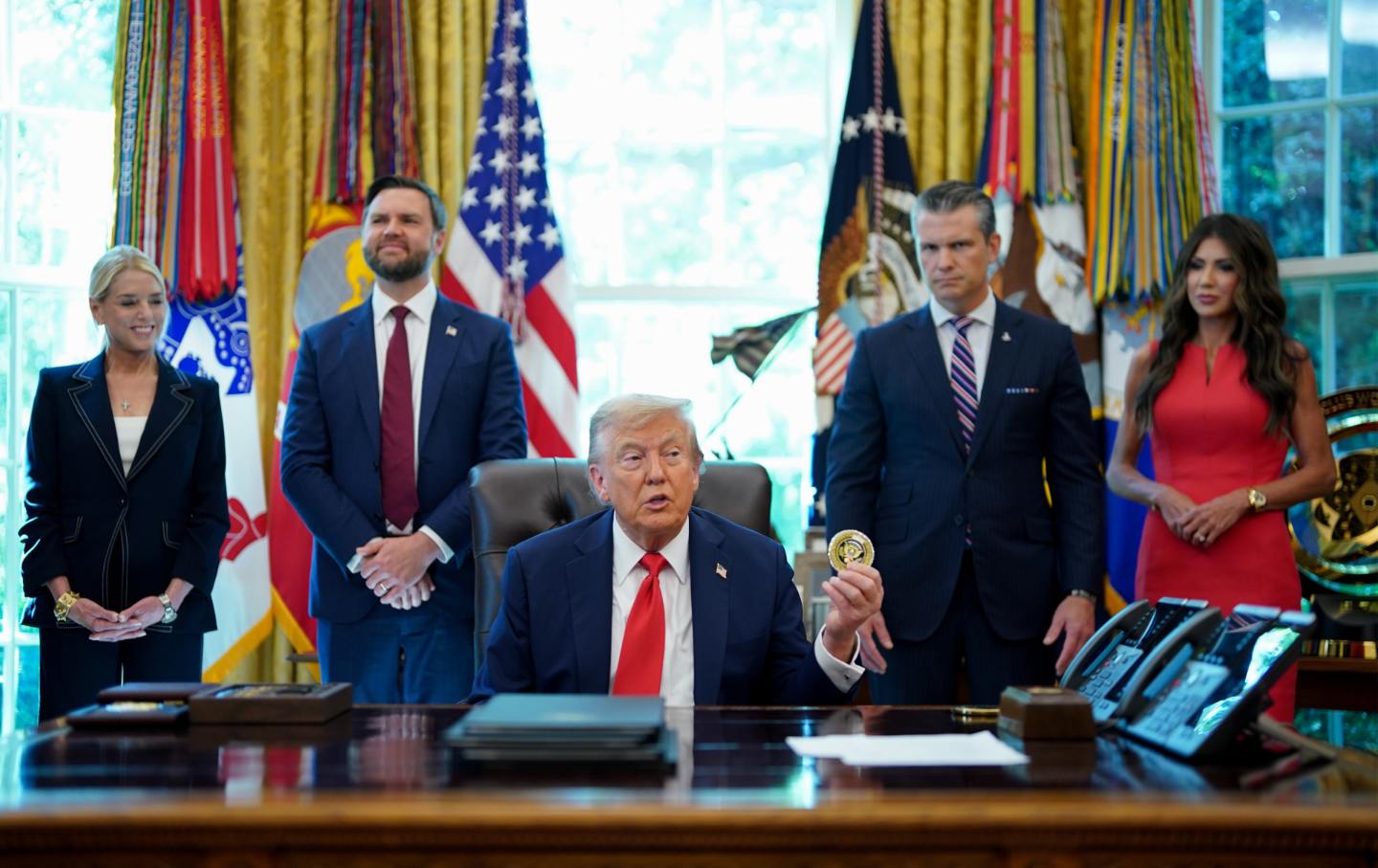Trans People Shouldn’t Be Scapegoated for Democrats’ Failures
Politicians and pundits are stoking a backlash to trans rights in the wake of the election. They’re playing a dangerous game.

Vice President Kamala Harris speaks onstage during a Pride celebration on June 28, 2023, in Washington, DC.
(Tasos Katopodis / Getty Images for GLAAD)Donald Trump’s election victory foreshadows an administration that will likely seek to not just dismantle but destroy the regulatory state, while promoting a narrow vision of what America should be and who should benefit from living here.
But as election results continue to trickle in, it has also become clear that the governing majority needed to achieve these goals may not be as robust as it was projected on election night. Trump failed to win 50 percent of the popular vote, and the GOP’s House and Senate majorities are both razor-thin.
Yet instead of thinking about how this unexpectedly small mandate on how this could be used for their advantage, a subset of Democrats have decided to spend their time saying that the true reason for the 2024 election loss lies with some of their coalition’s most vulnerable members: transgender Americans and the allies that seek to protect their civil rights.
Almost immediately after Trump’s victory, a number of Democratic politicians, as well as major advisers in the party’s inner and outer circles, rushed to the airwaves and their social media accounts to say that the party had lost touch with the average American by catering to the fringes of the party. Their statements all seemed to feature two main points: first, that the “far left” had captured the Democratic machinery’s stance on social issues, leading to alienation from voters, and second, that Democrats need to distance themselves from support for trans kids who want to play on sports teams that match their gender identity.
One representative, Seth Moulton of Massachusetts’s Sixth District, told The New York Times, “I have two little girls, I don’t want them getting run over on a playing field by a male or formerly male athlete, but as a Democrat I’m supposed to be afraid to say that.”
In Texas, former party leader Gilbert Hinojosa said that ultimately Democrats “have a choice as a party” of what kind of issues to champion and which kind of issues to compromise on.
“You could, for example, you can support transgender rights up and down all the categories where the issue comes up, or you can understand that there’s certain things that we just go too far on, that a big bulk of our population does not support,” he added. (He later apologized before resigning his post altogether in the wake of the party’s decisive loss in the state.)
These points have been reinforced by other pundits such as Pamela Paul, the preeminent “transgender rights conversations have gone too far” whisperer at the Times, who wrote an op-ed this week saying the Democratic Party needs to adopt “common-sense” approaches to transgender rights. The message from all of these figures was the same: Pushing for equal civil and human rights must not make those who might face discomfort from what that entails pay any cost.
As much as these powerful political insiders and commentators would like to scapegoat children who just want to play soccer on the team that feels right for them, the evidence to suggest that trans rights were a decisive factor in the election is slim. Exit polls following the election have shown that the state of the economy, an overall desire for change at all costs, and party drift in certain demographics to the right were the main reasons propelling Trump to an electoral victory, not social issues. Even a plurality of those who believe abortion should be legal in most cases—a cause célèbre for the Democratic coalition—voted for Trump. What’s more, voters in Delaware elected the first openly trans congressperson in history, Democrat Sarah McBride. (Republicans immediately launched transphobic attacks on McBride, including trying to bar her from using the women’s restroom.)
Yet despite all of this, politicians looking to score a cheap hit on a vulnerable group are happy to use trans Americans as an example because the party knows the community does not have much of an alternative electorally.
“They are the only real political avenue who are willing to represent us and defend us, but at the same time we aren’t being listened to,” Brey, a trans voter in Connecticut, told The Nation following a week of comments by party members singling out her community. This kind of punching down serves nobody except the reactionary forces trying to erase trans people from the landscape altogether.
Perhaps one reason trans rights became perceived as a troubling issue for Democrats is because they seemed so uncomfortable defending them. For instance, Kamala Harris gave evasive, vague answers when asked about her support for gender-affirming care, sending voters a message that she had something to hide and raising the political salience of the issue. Contrast that approach to that of Kentucky Governor Andy Beshear, who loudly stood up for trans people in a very red state and won reelection convincingly in 2023.
“There are so many ways in which during the election the Democrats could have turned Republican rhetoric against them,” Brey added.
Republicans are continually trying to ban transgender minors from accessing healthcare. Democrats, including politicians such as Moulton, have backed legislation such as the Transgender Bill of Rights and the Equality Act, which would enshrine federal civil rights protections for transgender Americans into law. However, whenever Democrats face adversity, some members of the party coalition seem immediately prepared to compromise on these civil rights promises in search of hypothetical bipartisanship.
As we’ve seen, this kind of triangulation does not yield electoral success. And it only serves to weaken support for the transgender community at a time when the party planning to take power next January has broader goals of subjugation in mind.
Popular
“swipe left below to view more authors”Swipe →“What’s not helpful right now are random hot takes based on nothing and the scapegoating of people who’ve long been in MAGA’s crosshairs,” Brandon Wolf, national press secretary for the Human Rights Campaign, an LGBTQ rights advocacy group, told The Nation. “There’s no denying that Democrats lost on Tuesday, and everyone needs to do some introspection and learning based on meaningful conversations with people across the political divide and hard data. We have work to do. But that work is about being more welcoming, not less, and reaching more people with real solutions to actual problems.”
It’s unclear how the party will address this emerging fissure going forward, as Trump tries to ram through a cavalcade of cabinet appointees, taking up the immediate attention of a party that still controls the White House and Senate for the next two months.
Moulton says the uproar his comments caused just shows how he was correct to bring up the issue in the first place. “We’ve got to be able to have these debates,” he added. But thankfully, we can also point to some of his other words, which Democrats everywhere should heed: “We did not lose the 2024 election because of any trans person or issue.”
Disobey authoritarians, support The Nation
Over the past year you’ve read Nation writers like Elie Mystal, Kaveh Akbar, John Nichols, Joan Walsh, Bryce Covert, Dave Zirin, Jeet Heer, Michael T. Klare, Katha Pollitt, Amy Littlefield, Gregg Gonsalves, and Sasha Abramsky take on the Trump family’s corruption, set the record straight about Robert F. Kennedy Jr.’s catastrophic Make America Healthy Again movement, survey the fallout and human cost of the DOGE wrecking ball, anticipate the Supreme Court’s dangerous antidemocratic rulings, and amplify successful tactics of resistance on the streets and in Congress.
We publish these stories because when members of our communities are being abducted, household debt is climbing, and AI data centers are causing water and electricity shortages, we have a duty as journalists to do all we can to inform the public.
In 2026, our aim is to do more than ever before—but we need your support to make that happen.
Through December 31, a generous donor will match all donations up to $75,000. That means that your contribution will be doubled, dollar for dollar. If we hit the full match, we’ll be starting 2026 with $150,000 to invest in the stories that impact real people’s lives—the kinds of stories that billionaire-owned, corporate-backed outlets aren’t covering.
With your support, our team will publish major stories that the president and his allies won’t want you to read. We’ll cover the emerging military-tech industrial complex and matters of war, peace, and surveillance, as well as the affordability crisis, hunger, housing, healthcare, the environment, attacks on reproductive rights, and much more. At the same time, we’ll imagine alternatives to Trumpian rule and uplift efforts to create a better world, here and now.
While your gift has twice the impact, I’m asking you to support The Nation with a donation today. You’ll empower the journalists, editors, and fact-checkers best equipped to hold this authoritarian administration to account.
I hope you won’t miss this moment—donate to The Nation today.
Onward,
Katrina vanden Heuvel
Editor and publisher, The Nation
More from The Nation


The Supreme Court Has a Serial Killer Problem The Supreme Court Has a Serial Killer Problem
In this week's Elie v. U.S., The Nation’s justice correspondent recaps a major death penalty case that came before the high court as well as the shenanigans of a man who’s angling...

Corporate Democrats Are Foolishly Surrendering the AI Fight Corporate Democrats Are Foolishly Surrendering the AI Fight
Voters want the party to get tough on the industry. But Democratic leaders are following the money instead.

Marching Against a Corrupt Regime Marching Against a Corrupt Regime
People taking to the streets for democracy.

It Would Be Madness to Give Trump and His Toadies Even More Power It Would Be Madness to Give Trump and His Toadies Even More Power
And yet, that’s what the Supreme Court appears prepared to do.

Trump Is Dragging Republicans to Crushing Defeat After Crushing Defeat Trump Is Dragging Republicans to Crushing Defeat After Crushing Defeat
The president is deeply unpopular, his policies are failing, and Republicans are losing—everywhere.


